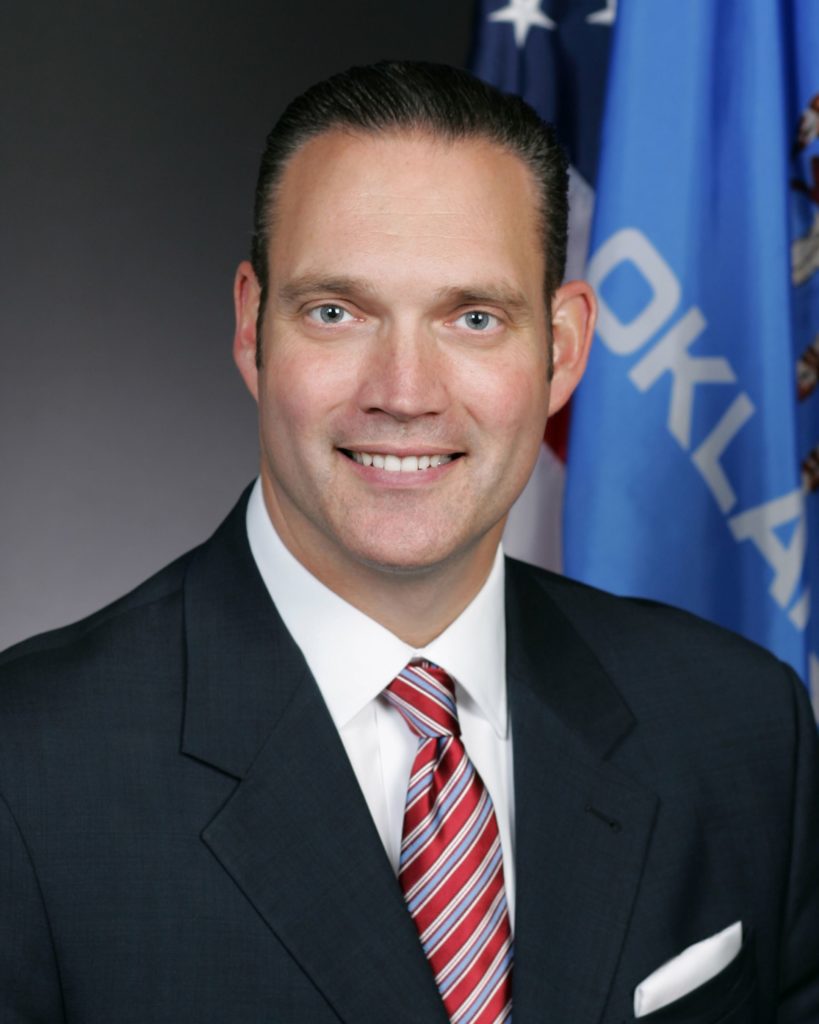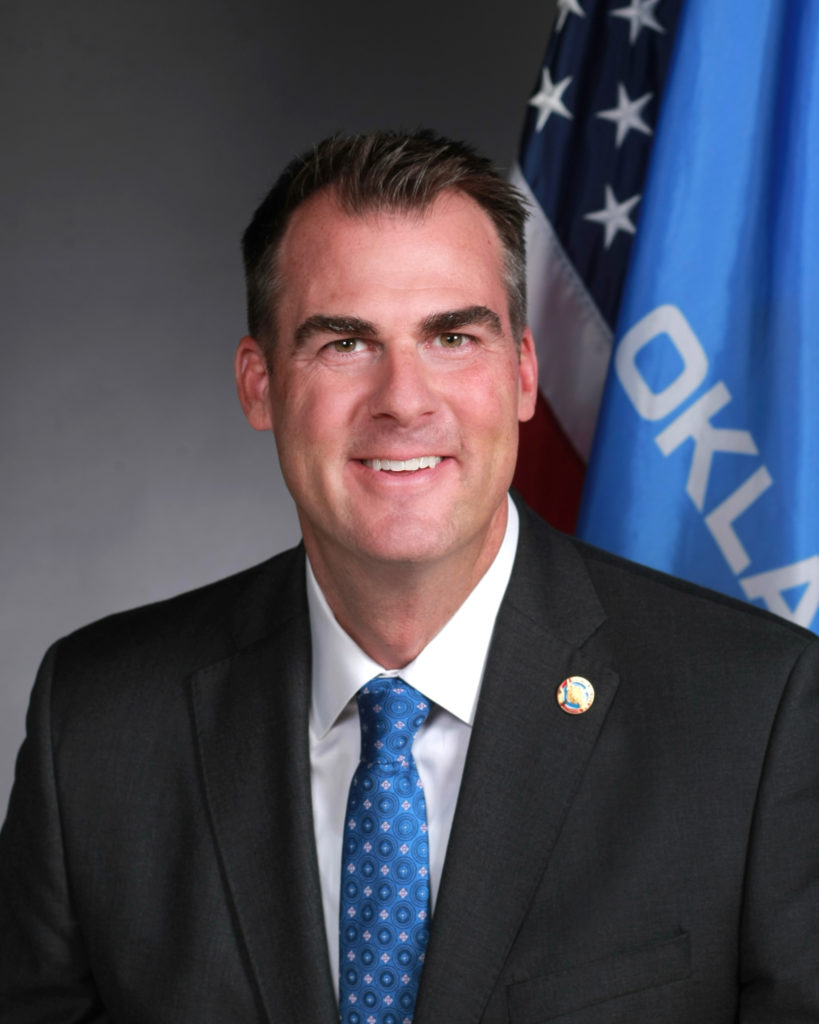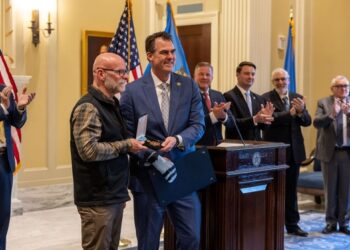OKLAHOMA CITY (OBV) – The Oklahoma State Senate overwhelmingly passed a bill which cuts the state’s grocery tax, sending the bill to Gov. Kevin Stitt for final approval.
Stitt issued the following statement, expressing his enthusiasm for the bill’s passage:
“Today, we get to fulfill a promise to all four million Oklahomans and pass the largest single year tax cut in Oklahoma history. Cutting the grocery tax means relief for all Oklahomans.
I’ve called for tax cuts since 2019 and in 2022 I called a special session specifically to cut the grocery tax. I want to thank Speaker McCall and the House for tirelessly fighting for tax cuts, and to Pro Tem Treat and the Senate for sending this to my desk.
I’m going to always fight for limited government and lower taxes, and I will still advocate to get us on path to zero income tax. This is a victory I’m excited to celebrate.”
Gov. Kevin Stitt

The Senate passed House Bill 1955, which eliminates the state’s portion of the grocery tax on food and food ingredients, with a vote of 42-2 on Thursday.
The House of Representatives passed HB 1955, written by House Speaker Charles McCall, R-Atoka, 11 months ago during last year’s legislative session.
“This is a truly historic day. With the passage of House Bill 1955, the Legislature has managed to give Oklahomans the largest single year tax cut in state history, returning $411 million to our citizens at a time when they need it the most,” McCall said. “I would like to give a tremendous amount of credit to my colleagues in the House who have fought through both regular and special sessions over the past three years to cut taxes and provide relief to the citizens of Oklahoma. Their persistence and willingness to come in on weekends, holidays and during the interim to do the work of the people has led to a policy that will help all Oklahomans.”
McCall praised the Senate for passing the bill, which now only requires Stitt’s signature to become law.
“I would like to thank Gov. Stitt for his leadership throughout this process and his unwavering support in cutting taxes. He has been an ally and vocal proponent of getting tax relief legislation to his desk, and I am glad the Senate is finally delivering to him a bill that will help all Oklahomans,” McCall said. “I would also like to thank President Pro Temp Greg Treat and our colleagues in the Senate for finally voting this legislation through to the governor’s desk. The delay in the vote cost Oklahomans an estimated additional $374 million in taxes, and the lack of an emergency to immediately put the cuts in place will cost our citizens another $200M, but Senate leadership did their best to at least secure passage. The House has sent several tax cuts to the Senate over the last three years only to have them stall and not be heard. Thankfully this legislation has finally passed after 332 days of waiting. Oklahomans are currently facing some of the worst inflation of the last three decades, and the Senate’s vote today means that help is finally on the way.”
Oklahoma’s state sales-tax rate, which is placed on grocery and other retail purchases, is 4.5 percent.
Treat announced on Wednesday that the Senate would pass the bill.

“I have long been an advocate for giving Oklahomans relief at the grocery store,” Treat said. “Our caucus had a robust, and lengthy debate over where and how to cut taxes for Oklahomans. While there were many good ideas and different ways to cut taxes we discussed, the caucus has collectively coalesced around cutting the state portion of the grocery tax. Once signed into law and after it takes effect, this will give Oklahomans relief every time they purchase groceries. This legislation is common sense and will help everyone.”
McCall said an income tax cut is also needed.
“There is continued work to be done to give Oklahomans back more of their hard-earned money. While the grocery tax is a good first step, it is not the only action needed to accomplish that goal,” McCall said. “The House always knew this legislation would pass if put up for a vote, and we feel the same way about the .25% income tax cut. The House would still like to see a vote taken on the income tax cut legislation that was passed to the Senate in special session, and will continue to explore every opportunity to lower the tax burden for all Oklahomans.”
Treat said Wednesday that the Senate will not pursue any other tax cuts this session.
“To be clear – this is the only tax relief the Senate will be seeking this year. To ensure state services and recent critical investments in education and infrastructure remain intact in the long and short term, there is no way to do more at this time,” Treat said. I appreciate my Senate colleagues who have worked on this issue for months and who also agree this is the best path forward. We have done a tremendous job of holding the line and not giving in to cheap political wins or rhetoric that would have put the state on the wrong fiscal path.”
Stitt announced last week that the Board of Equalization certified $13.9 billion in authorized funds, including $11.1 billion in reoccurring funds and $2.8 billion in one-time funds. Stitt pushed for both a grocery tax cut as well as an income tax cut.
Stitt has repeatedly pushed for income tax cuts, even calling two special sessions – one in September and one before the start of the 59th Legislature.
The governor released the following statement last week, stressing the need for tax cuts:

“It’s no accident Oklahoma has record-breaking state savings, higher than expected revenue, and an objectively strong fiscal outlook from three of the nation’s top credit agencies. These accomplishments are the result of our conservative approach to governance, and every Oklahoman will benefit once the Legislature cuts their taxes and delivers a pay raise.
Oklahomans are already asking: ‘How much money does the state need?’ Make no mistake, today’s news from the Board of Equalization is not an invitation for the Legislature to spend all $11.1 billion. We must continue to practice fiscal conservatism by returning excess revenue back to Oklahomans in the form of tax cuts.
Oklahomans have waited long enough for a pay raise and for relief at the grocery store. It’s reassuring to see legislation in both chambers. There are no more excuses, let’s get those passed. I’m ready to sign any tax cut that comes to my desk.”
Gov. Kevin Stitt
Treat also released a statement on the need for a tax cut last week, stressing the importance of being “sober-minded,” saying that both a grocery tax cut and income tax cut should not be pursued in the same year. That statement is as follows:
“These numbers are certainly encouraging, and they show a lot of promise,” Pro Tem Treat said. “With these numbers and the current savings we have, now is the time to cut the grocery tax. Cutting the grocery tax will give Oklahomans immediate relief every time they leave the grocery store and will be more beneficial than any other form of tax cut.
While the certified numbers are positive, we must be sober-minded and realize we cannot have both a grocery tax cut and an income tax cut this year. I appreciate the prudence and fiscal conservatism of my Senate colleagues, who over the years have prioritized spending and savings and have put a stop to nonsensical ideas that would lead our state in the wrong direction. Without our measured approach, we would not be in this position today.”
Pro Tem Greg Treat
Treat has clashed with Stitt over tax cuts, having adjourned the Senate on the first day of the last two special sessions. He said both times that it would be irresponsible to pass tax cuts before knowing how much in authorized funds the legislature would have.
The push for tax cuts in the 59th Legislature began earlier this month when McCall filed several tax cut bills. Those bills are as follows:
- HB 2948 – Corporate income tax phase out over five years.
- HB 2949 – Flat rate 4.25% personal income tax effective Jan. 1, 2024; rate imposed on taxable income amounts above specific figures based on filing status.
- HB 2950 – .25% personal income tax decrease effective Jan. 1, 2024, and following tax years.
- HB 2951 – .25% personal income tax decrease for 2024 and 2025, with rates to restore to current level (current rates and brackets) for 2026, and following tax years.
- HB 2952 – .50% personal income tax decrease for 2024 and 2025, with rates to restore to current level (current rates and brackets) for 2026, and following tax years.
The Oklahoma legislature has passed other tax reform measures during the past two legislative sessions, including eliminating the franchise tax, allowing full expensing of capital investments for businesses and eliminating the marriage penalty within the state’s individual income tax law.
Oklahoma’s individual income tax system has six income tax brackets ranging from 0.5 percent to 4.75 percent for top earners. The 4.75 percent rate kicks in at a $7,000 annual income.
All Oklahomans and more than 95 percent of businesses in the state pay the individual income tax. The income tax’s standard deduction is $6,350 for single filers and $12,200 for joint filers.
Stillwater Mayor Will Joyce issued the following statement on Facebook on Wednesday, expressing his concern regarding the grocery tax cut:
“The Oklahoma Senate’s plan to pass a grocery sales tax cut tomorrow is very concerning to the future of municipal governments in this state. While I wholeheartedly agree that groceries should not be taxed at all, the fact remains that Oklahoma is the only state in the country that forces cities to pay the operating expenses of police, fire, streets, parks, and all other general fund expenses out of sales tax revenue.
Cutting the state’s portion of the grocery sales tax will lead to tremendous confusion among the public about why taxes are still being collected by the cities (and counties in many places), and will eventually lead to calls for those sales taxes to be cut too. This would be absolutely devastating to every city in the state, requiring cuts to police forces, fire departments, and every other essential service the city provides.
This is just the latest example of our state legislature’s short sighted approach. The bill itself will be a nightmare for store owners trying to decipher what is considered “food” and they will have to update systems to apply different rates to specific items in their stores. Again, I agree with getting rid of grocery sales tax, but this is a complex system and it needs to be handled carefully and thoughtfully. They need to consider all of the possible consequences.
It is past time for the state legislature to stop looking for the path of least resistance to win elections and pacify pundits. Fix the real problems! Do the hard work to overhaul the tax system so our governments can provide the essential services our residents require without placing the heaviest burden on the lowest income earners.
Please contact your state senator (Tom Dugger and Chuck Hall, if you’re in Stillwater) and ask them to vote NO on HB1955.”
Mayor Will Joyce

















